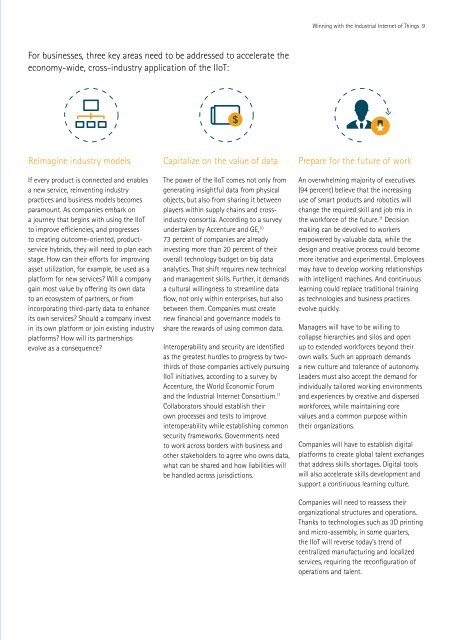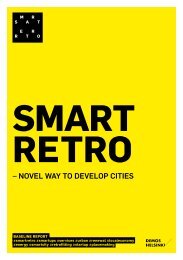Accenture-Industrial-Internet-of-Things-Positioning-Paper-Report-2015
Accenture-Industrial-Internet-of-Things-Positioning-Paper-Report-2015
Accenture-Industrial-Internet-of-Things-Positioning-Paper-Report-2015
Create successful ePaper yourself
Turn your PDF publications into a flip-book with our unique Google optimized e-Paper software.
Winning with the <strong>Industrial</strong> <strong>Internet</strong> <strong>of</strong> <strong>Things</strong> 9<br />
For businesses, three key areas need to be addressed to accelerate the<br />
economy-wide, cross-industry application <strong>of</strong> the IIoT:<br />
Reimagine industry models<br />
If every product is connected and enables<br />
a new service, reinventing industry<br />
practices and business models becomes<br />
paramount. As companies embark on<br />
a journey that begins with using the IIoT<br />
to improve efficiencies, and progresses<br />
to creating outcome-oriented, productservice<br />
hybrids, they will need to plan each<br />
stage. How can their efforts for improving<br />
asset utilization, for example, be used as a<br />
platform for new services Will a company<br />
gain most value by <strong>of</strong>fering its own data<br />
to an ecosystem <strong>of</strong> partners, or from<br />
incorporating third-party data to enhance<br />
its own services Should a company invest<br />
in its own platform or join existing industry<br />
platforms How will its partnerships<br />
evolve as a consequence<br />
Capitalize on the value <strong>of</strong> data<br />
The power <strong>of</strong> the IIoT comes not only from<br />
generating insightful data from physical<br />
objects, but also from sharing it between<br />
players within supply chains and crossindustry<br />
consortia. According to a survey<br />
undertaken by <strong>Accenture</strong> and GE, 10<br />
73 percent <strong>of</strong> companies are already<br />
investing more than 20 percent <strong>of</strong> their<br />
overall technology budget on big data<br />
analytics. That shift requires new technical<br />
and management skills. Further, it demands<br />
a cultural willingness to streamline data<br />
flow, not only within enterprises, but also<br />
between them. Companies must create<br />
new financial and governance models to<br />
share the rewards <strong>of</strong> using common data.<br />
Interoperability and security are identified<br />
as the greatest hurdles to progress by twothirds<br />
<strong>of</strong> those companies actively pursuing<br />
IIoT initiatives, according to a survey by<br />
<strong>Accenture</strong>, the World Economic Forum<br />
and the <strong>Industrial</strong> <strong>Internet</strong> Consortium. 11<br />
Collaborators should establish their<br />
own processes and tests to improve<br />
interoperability while establishing common<br />
security frameworks. Governments need<br />
to work across borders with business and<br />
other stakeholders to agree who owns data,<br />
what can be shared and how liabilities will<br />
be handled across jurisdictions.<br />
Prepare for the future <strong>of</strong> work<br />
An overwhelming majority <strong>of</strong> executives<br />
(94 percent) believe that the increasing<br />
use <strong>of</strong> smart products and robotics will<br />
change the required skill and job mix in<br />
the workforce <strong>of</strong> the future. 11 Decision<br />
making can be devolved to workers<br />
empowered by valuable data, while the<br />
design and creative process could become<br />
more iterative and experimental. Employees<br />
may have to develop working relationships<br />
with intelligent machines. And continuous<br />
learning could replace traditional training<br />
as technologies and business practices<br />
evolve quickly.<br />
Managers will have to be willing to<br />
collapse hierarchies and silos and open<br />
up to extended workforces beyond their<br />
own walls. Such an approach demands<br />
a new culture and tolerance <strong>of</strong> autonomy.<br />
Leaders must also accept the demand for<br />
individually tailored working environments<br />
and experiences by creative and dispersed<br />
workforces, while maintaining core<br />
values and a common purpose within<br />
their organizations.<br />
Companies will have to establish digital<br />
platforms to create global talent exchanges<br />
that address skills shortages. Digital tools<br />
will also accelerate skills development and<br />
support a continuous learning culture.<br />
Companies will need to reassess their<br />
organizational structures and operations.<br />
Thanks to technologies such as 3D printing<br />
and micro-assembly, in some quarters,<br />
the IIoT will reverse today’s trend <strong>of</strong><br />
centralized manufacturing and localized<br />
services, requiring the reconfiguration <strong>of</strong><br />
operations and talent.




